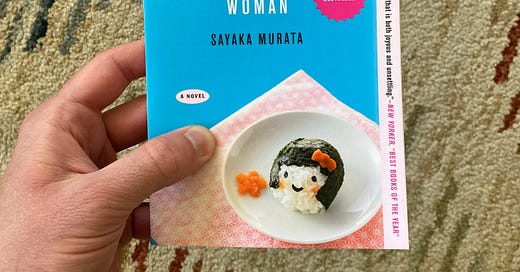Every new year, instead of making resolutions, I send thank you notes to people who made a difference in my life—sometimes big, sometimes small, sometimes recent, sometimes long ago. It’s amazing how expressing gratitude lights up both the expresser and recipient.
With that in mind, I want to take a moment to thank each and every one of the thousands of beautiful nerds who subscribe to this newsletter. Some of you are regular visitors to this little corner of the internet. Some of you just arrived for the first time. From what I’ve learned from your replies over the years, all of you are unusually generous, thoughtful, ambitious, kind, and creative.
As a writer, I often think about how strange writing is. Assemble the right combination of squiggly little shapes and you can make someone laugh, cry, feel understood, or look at life through a new lens. It’s magic—a special kind of magic that, like friendship, only works between people. Writers don’t build buildings. We draw up blueprints. Readers use those narrative blueprints, that collection of squiggly little shapes, to construct the story in their imaginations. In this way, stories are cocreated by readers and writers, and I couldn’t ask for a better group of people to make stories for and with.
And now, a book I love that you might too:
Convenience Store Woman by Sayaka Murata does that special thing that prose fiction, at its best, does so well: invite you inside someone else’s head. In this particular case, it invites you inside the head of someone who’s never been able to fit in, who struggles to navigate social norms despite how keenly she observes them, who looks at the world differently. In a world largely determined by opaque systems, she finds a place for herself working in a Tokyo convenience store, but when they hire a difficult new employee who also approaches reality from an unusual angle, she’s forced to reassess the life she’s built for herself. Funny, engaging, and rich with psychological and sociological insight, this short novel will weird you out in the best possible way, broadening your understanding of what it means to be human.
Things worth sharing:
Over on the Lit Visions podcast, I talked to Dhrupad Karwa about the power of speculative fiction, telling stories set in the near future, building an audience for your creative work, and how I wrote Reap3r.
A cure for writer’s block (also applies to other kinds of creative work): If writing feels hard, try doing nothing. No phone, no music, no laundry—nothing. Sit in front of a blank page doing absolutely nothing for long enough, and filling it will feel easy.
This is the kind of response that makes writing a novel worth the effort.
Mythic Quest does such a good job telling the story of creativity. At some level, every novel is about writing a novel, every song is about composing a song, and a series about making a video game is really about making a series—creativity is recursive.
Nice to see my conversation with Danny Crichton show up on Lux Capital's list of their favorite podcast episodes of 2022: “Peper sits down to talk about why speculation, utopias, and dystopias can help us understand the present (and also be an enjoyable experience in and of themselves).”
Nabeel Hyatt, a subscriber to this humble newsletter, created the coolest AI project I’ve seen with his kids.
Speaking of embarking on 2023, if you make things on the internet, this is a great time to meander up some of Robin Sloan’s new avenues—he is an accomplished cartographer of digital geography, a landscape as prone to shifting as the place where so much of it is built: earthquake-abundant California.
No matter how much I'd like to plan a story before writing it, the only way to figure out what the story needs to be is by writing it. Of course, this doesn't prevent me from trying to plan the next story, until I relearn the same lesson, toss the plan, and just start writing.
ICYMI: The best books I read in 2022.
Glass Onion was a lot of fun, so much fun that it made me realize how few movies feel like they aspire to be fun. Lots of stories work so hard to be taken seriously that they succeed, to their detriment. Fun is fun! Tell more fun stories!
From Breach: “Instead of trying to cover up the damage, the repair is illuminated, the imperfections transformed into a source of beauty. I've always seen kintsugi as a physical manifestation of mono no aware, the pathos of impermanence, the gentle awareness that everything, all of us, are fragile and transient, that change is the only constant, that we are, at our best, lovingly reconstructed patchworks of our shattered selves.”
Thanks for reading. We all find our next favorite book because someone we trust recommends it. So when you fall in love with a story, tell your friends. Culture is a collective project in which we all have a stake and a voice.
Best, Eliot
Eliot Peper is the author of Reap3r, Veil, Breach, Borderless, Bandwidth, Neon Fever Dream, Cumulus, Exit Strategy, Power Play, and Version 1.0. He also works on special projects and tweets more than he probably should.
“The reigning king of speculative thrillers.”
-Brian Merchant, editor of Terraform, on Reap3r




